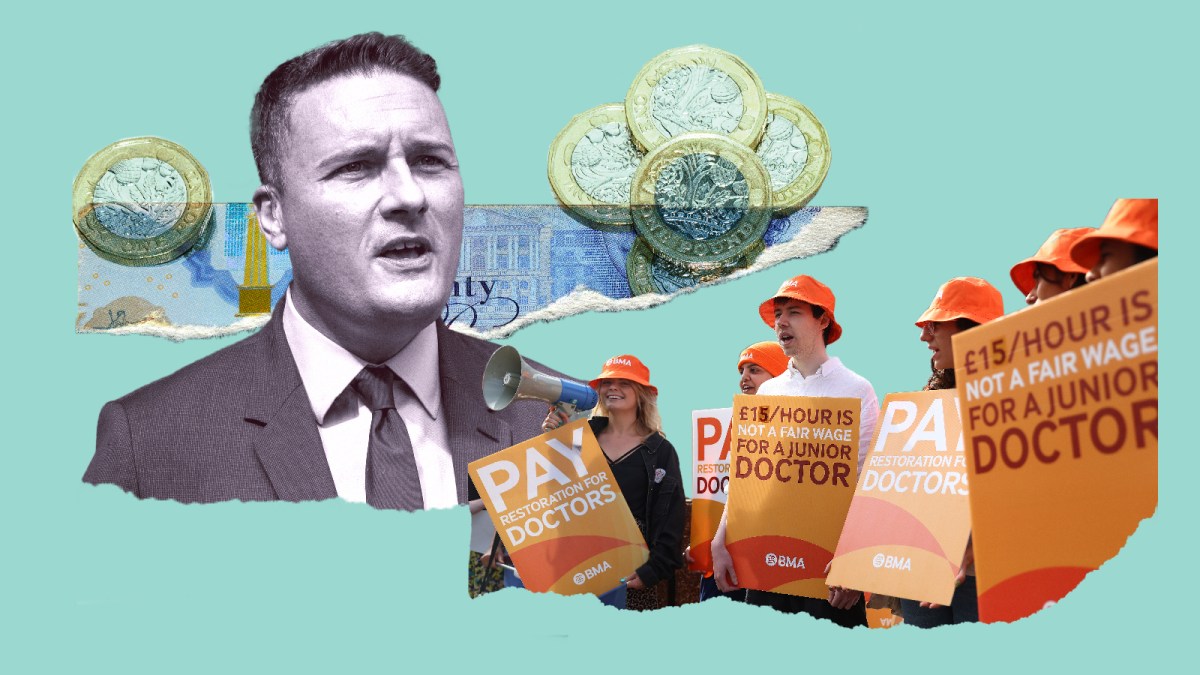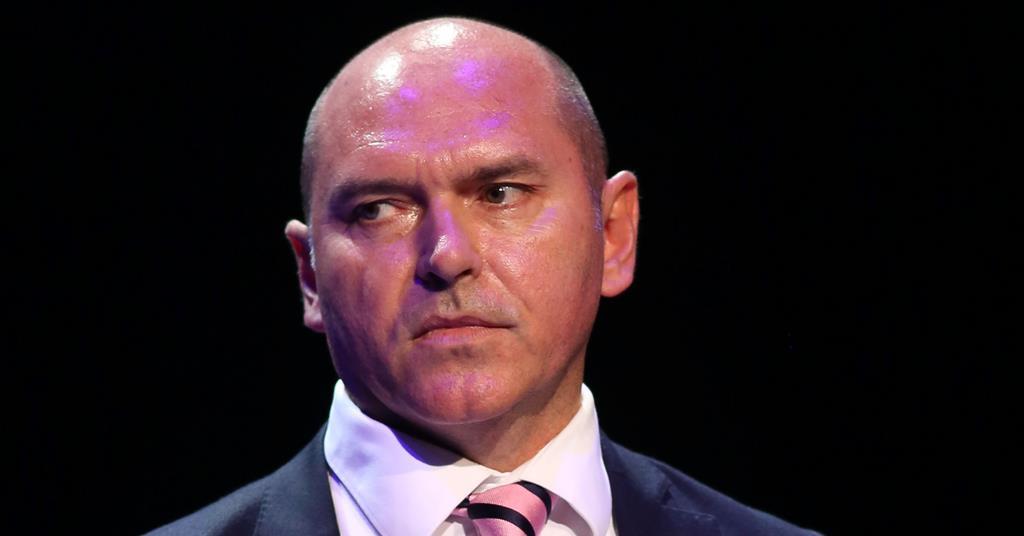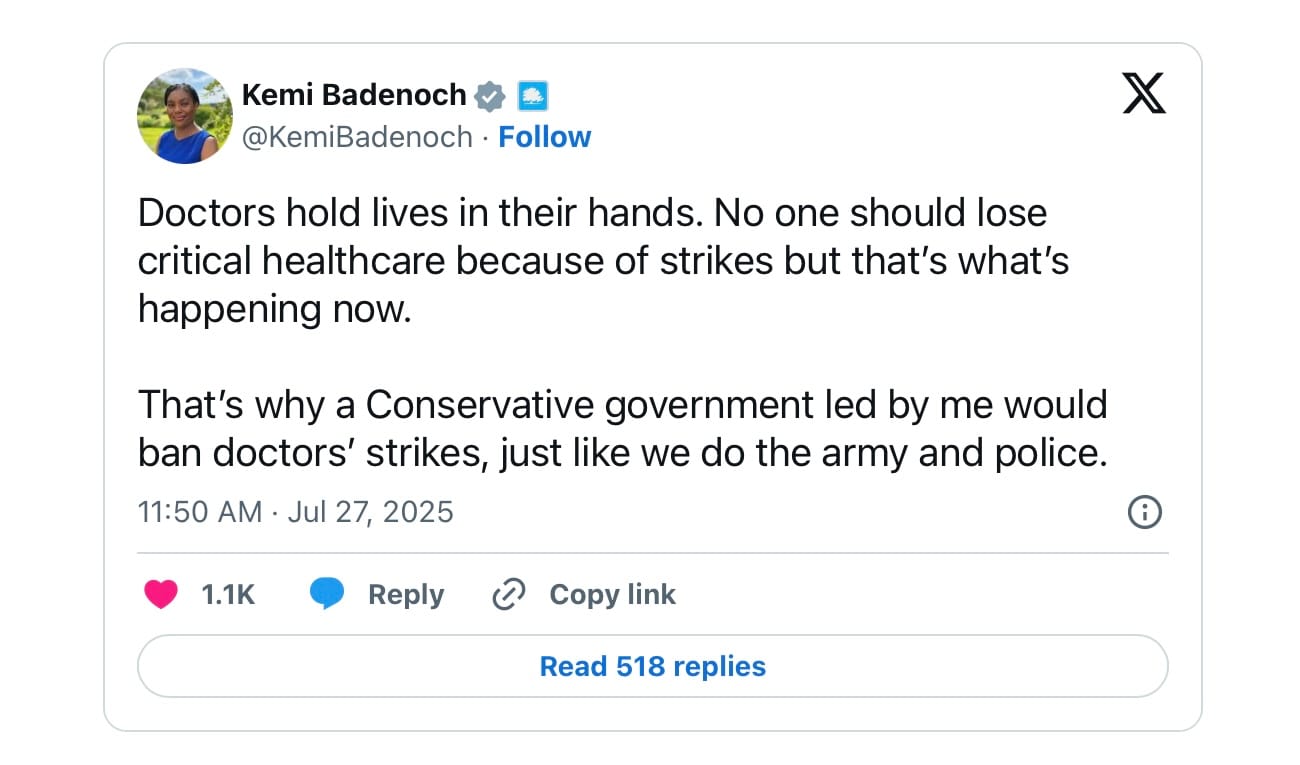Cowper’s Cut 386: Irony while the strike’s hot

This week, we saw the BMA Resident Doctors 2008 Pay Differential Historical Re-Enactment Society charging into inaction, as they took their first round of industrial action over pay against the Labour government that gave them a 28% pay rise. Liveblogs by The Guardian and The Times covered Friday’s events.
(Liveblogs! Remember health policy Liveblogs? It was just like the good old Lansley reform era. Nostalgia isn’t what it used to be.)
I wondered in last week’s column whether the residents’ leadership might use their talks with the Health Secretary to call off a strike that didn’t enjoy public support before it even started, and came to the conclusion that “Corbynistas are not primarily noted for their pragmatism”. So it proved.
I also wrote that “residents’ leaders face uncertain levels of internal support if they do take the planned industrial action next week”. It’s too early for official data on strike turnout, but anecdotally, what I’ve heard suggests that this round of strikes is much less well-supported.
It’s undoubtedly true that NHS England’s stated determination to keep as much scheduled care on track as possible this time is built on top of what hospitals learned about continuing operations from the many bouts of industrial action against the previous Government, where ‘Christmas Day cover’ during strikes was mostly the norm.

UCLH staff told The Sunday Times that they had managed to keep over 95% of planned care going ahead as planned, and that only 27 per cent of their resident doctors walked out on Friday: their medical director reported, “last year that (striking turnout) would have been in the thirties, forties and on some days 50 per cent”.
Now that is UCLH: a well-run major teaching hospital, so it’d be foolish to generalise nationally from that number.
But it may not be terribly far off. If strike turnout has indeed been low, this opens another opportunity for the BMA Resident Doctors 2008 Pay Differential Historical Re-Enactment Society to indulge themselves even more deeply in the sunk cost fallacy: equally, it may drive disillusionment among those residents who did reluctantly take action this time. It could do both.
If so, a plausible outcome would be greater BMA doubling-down on more strikes, which enjoy lower turnout.
The Corbynista ‘Doctors Vote’ crew who have taken control of the BMA via perfectly legal entryism will be in their element with this dispute. They will have been inspired by chair of Council Tom Dolphin’s remarks that Full Pay Restoration is “a principle”, rather than feeling that this comment shut down room for negotiation. These are Very Online People, who will find endless validation of their priors in resident doctors’ WhatsApp groups and on medical Reddits. If we’re really lucky, there might be a BMA Resident Doctors 2008 Pay Differential Historical Re-Enactment Society TikTok channel, which could surely brighten all of our lives.
The question now facing the community of resident doctors is whether they feel themselves well-represented by such people.
Time and turnout will tell.
Weak, weak, weak

The Times’ Whitehall editor Chris Smyth appears to be Team Streeting’s national print media briefee of choice, and on Wednesday Chris was informed that “Streeting privately drew the conclusion that Nieuwoudt and Ryan were unable to deliver a deal because they were not strong enough to stand up to the rest of their committee and a vocal online army of frustrated doctors.
There is no doubting the genuine fury of senior figures in Team Streeting, NHS England and the Department For Health But Social Care that comes across in Smyth’s article, who believed that they had made sufficient progress for the strike to be suspended. Equally, there was clearly a bit of naivety in play over their confidence in their perceived relationship with the resident’s leaders.
This played into the comment pieces on Thursday from Mr Streeting and PM Sir Keir Starmer urging residents not to take the strike action.

An intriguing link to past health policy inflection points was this anti-strike interview given to the Boris Johnson Fanzine by Professsor Sir Robert Winston. Winston was a prominent and respected medical leader in the New Labour era, and a significant influence on the Labour Party’s then-leaders.

Winston’s outspoken 2000 interview with Mary Riddell in the New Statesman about his mother’s terrible care in a London hospital was one of the factors that played into ‘The Most Expensive Breakfast In History’ and the decision to hugely raise NHS spending by the Blair-Brown duopoly.
In pursuit of suffering

Health Service Journal’s Nick Kituno reported on NHS England chief executive Sir James Mackey’s comments to NHS leaders that the residents’ strikes should “not be pain-free” for the BMA.
It’s evidently sub-optimal for serious parties to be openly discussing causing the other side pain: this isn’t heavyweight boxing, with its attendant media circus’ belief in the need for theatrical trash-talking and stare-outs.
Obviously, you plan for this outcome, and you clarify and issue the legal rules by which opponents can be discomforted - but you don’t discuss it on a national briefing, which leaks like a digital sieve.

The other thing that you wouldn’t want to do is to speculate about restraint of doctors’ trade by preventing those who went on strike from picking up extra shifts to earn back the money they forewent by striking. Alas, this was a line briefed out to the media by Team Streeting.
The only slight problem is that this idea involves discrimination that fundamentally isn’t legal.
As well as not legal, it’s counter-productive. If the English NHS’s huge RTT backlog (and the non-RTT backlogs) are to come down any time soon, then you want everyone available working extra as much as possible.
Stupid political responses
The Liberal Democrats came up with a spectacularly stupid response to the strike action, with their spokesperson’s suggestion that there should be an ‘NHS Strike Resilience Plan’, using private hospitals for some treatments, to ensure that the harmful impacts of the strike are kept to a minimum for patients.
Yes, you read that right.
Lib Dem hospitals and primary care spokesperson Jess Brown Fuller said “the Liberal Democrats are calling for an NHS Strike Resilience Plan, to protect patients from suffering. The government needs to pull its finger out and ensure that private hospitals are on standby so that anyone set to receive treatment is not forced to go without and waitlists are not left to soar”.
To state the wildly obvious, the private sector does not have the type and size of spare capacity to do anything vaguely along these lines. Still, everyone loves a trier, allegedly - and this sort of thing sure is trying.

‘You think that’s stupid? Hold my beer’, was the message from Conservative And Unionist Party leader Kemi Badenoch, fresh from having replaced Edward Argar with Stuart Andrew as shadow health secretary in her shadow cabinet reshuffle.

Mrs Badenoch wrote on Kiss (formerly Twitter), “Doctors hold lives in their hands. No one should lose critical healthcare because of strikes but that’s what’s happening now. That’s why a Conservative government led by me would ban doctors’ strikes, just like we do the army and police.
“The BMA has become militant, these strikes are going too far, and it is time for action. Doctors do incredibly important work. Medicine is a vocation – not just a job. That is why in government we offered a fair deal that supported doctors, but protected taxpayers too.
“These strikes will have a significant economic effect, but they will also mean cancelled operations, worry for families of the sick, and suffering for those who are unwell. We know that previous strike action by doctors even led to some patients losing their lives.
“That is why Conservatives are stepping in, and setting out common sense proposals to protect patients, and the public finances. And we are making an offer in the national interest – we will work with the Government to face down the BMA to help protect patients and the NHS.”
One must have a heart of stone not to laugh at Mrs Badenoch’s ignorance of the fact that NHS critical care was still provided even during the ‘Christmas Day’ cover levels during the strikes against the last Conservative government.
More to the point, the NHS has seen staff industrial action over pay and conditions as early in its existence as the 1970s, and to put it politely, it is not clear that Mrs Badenoch has established a solid case that medical staff should lose the right to withdraw their labour in an industrial dispute.
Recommended and required reading
Roche’s chief executive has taken the bold step of saying it would be easy to cut his firm’s prices in the USA by 50%, in response to President Trump’s grumblings: he told the Financial Times that US healthcare needs to allow direct sales to patients and get intermediaries, known as pharmacy benefit managers, out of the equation.
Good old the International Monetary Fund: their latest country report on the UK suggests that the rich should co-pay for their use of the NHS. It’s almost sweet in its naivety.




